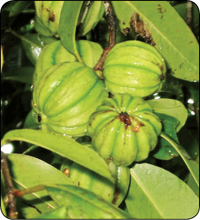Kachampuli, a vinegar of a kind prepared out of Panapuli fruit (Garcinia gummi-gutta) juice, is an indispensable kitchen ingredient in Kodagu homes, specially for ‘Pandikari’

Napoklu (Kodagu) :
Kodagu, which is known the world over for its rich and aromatic coffee, is also home to Panapuli fruit and the ‘ethnic’ Kachampuli vinegar produced from it.
Come monsoon, many people in Kodagu, especially the farmers, are busy harvesting the Panapuli fruit as there is a great demand for its dark syrup, also known as Coorg Vinegar, which is used as a souring agent in Kodava cooking.
This thick black vinegar is the concentrated juice of Garcinia gummi-gutta, the tropical fruit that is also used in dried form for cooking by some.
Panapuli fruit trees are found in some coffee estates and forest areas in Kodagu. The tree starts flowering during March-April and the fruits get ripened by June-July by which the fruit colour would have changed to yellow. The pulpy Panapuli fruit also has seeds inside it. To prepare the vinegar, the juice extracted from the ripened fruits, is boiled down in an earthen vessel using firewood till the juice turns thick and dark (brownish black). Then it is cooled and filled in bottles to be sold in the market. The Kachampuli (vinegar) is sold at rates ranging from Rs. 200 to Rs. 900 per bottle, depending upon the demand and can be preserved for years without adding any preservatives.
Kachampuli adds flavour to non-vegetarian Kodava cuisines like pork, mutton and fish. As for pork curry, chops or fry, it is a must culinary ingredient. Without it, pork preparation, specially, cannot be called a Coorg speciality dish.
Apart from extracting the juice to make vinegar, the ripened fruits are also used in dry form by many people including Keralites and Mangaloreans.
The fruit is cut into four parts and dried over an iron net under fire; before drying the fruit, first the 4 feet tall and 6 feet wide iron net with 4 supporting pillars is installed and the fire is lit under the net. The dried fruit is sold at Rs. 120-130 per kg.
Nowadays, Panapuli saplings are sold in nurseries. The fruit is a relative of Kokum, which is used in some Konkan and Maharashtrian cuisines too.
source: http://www.starofmysore.com / Star of Mysore / Home> General News / July 24th, 2015

